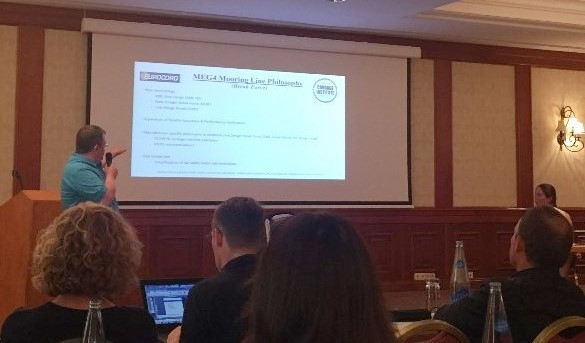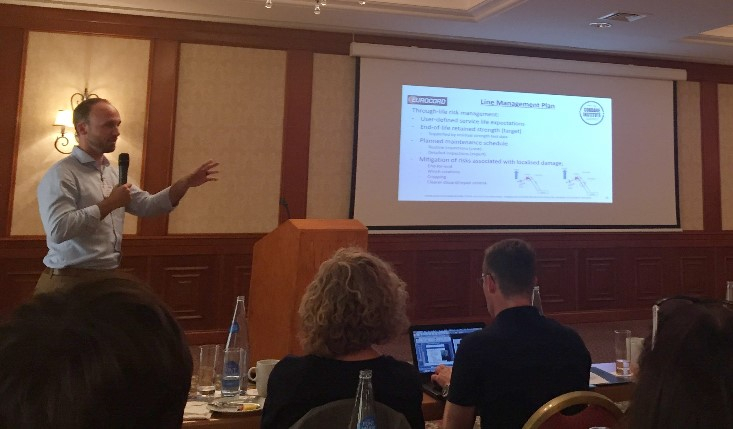"We have a common purpose to ensure the safety of maritime commerce through these troubled waters."
Director's Log

The OCIMF Executive Committee’s mid-term review of Strategy 2020 led to the Regional Panels evolving into Regional Marine Forums.
The Regional Marine Forums will be mobile within their designated region and, importantly, include an open forum to engage with the local maritime industry. This gives OCIMF an opportunity to share information and listen to the maritime community – and this will inform the work of the OCIMF Secretariat and Member committees. The inaugural Regional Marine Forum takes place in Tampa, Florida on the 11 to 12 July (see the agenda below). I look forward to seeing some of you there.
June saw the publication of the UK MAIB investigation of the mooring incident on the LNG carrier Zarga. OCIMF have been working closely with the investigation team to ensure that the fourth edition of our Mooring Equipment Guidelines (MEG) incorporates the lessons learned from this incident. The fully updated new edition will include information on the design, construction and management of moorings and mooring operations and new information on the purchasing and management of high modulus synthetic fibre (HMSF) ropes. OCIMF aims to publish MEG4 around the end of this year.
OCIMF and fellow industry NGOs met with the Operations Commander of EUNAVFOR at the end of June. This third meeting continued the discussion with industry on how support for free trade through Gulf of Aden and southern Red Sea area will be provided after operation ATALANTA ends on 31 December 2018. We have a common purpose to ensure the safety of maritime commerce through these troubled waters.
Stay safe,

Andrew Cassels
Director OCIMF
Do you have news that you'd like to share with our readers? If so email
MAIB report on Zarga
The Marine Accident Investigation Branch (MAIB) have published their final report on the accident investigation on board the LNG carrier Zarga following a mooring incident at Milford Haven in March 2015.
OCIMF has been working closely with the MAIB during the revisions to the Mooring Equipment Guidelines (MEG) and can confirm that the recommendations in the report have been addressed in the latest draft of MEG which is currently under technical approval.
OCIMF continues to support the work of the IMO correspondence group Safe Mooring Design and Operations.
The full report can be found by clicking this link.
North America Regional Marine Forum
The final agenda for the first North America Regional Marine Forum is now available.
The North America Regional Marine Forum will take place in Tampa, Florida, USA on 11 and 12 July. Day one of the forum is open to all members and to any non-members who work with tankers, terminals or Offshore Support Vessels (OSVs). Day two is a half day session that is only open to OCIMF members.
There are still a few places available for day one, but register soon to avoid disappointment. To register, please visit ocimf.org/organisation/regional-marine-forums/register-your-interest/.
The OCIMF Secretariat and our North American Regional Marine Forum Champion, Jan Ziobro (Shell), look forward to seeing you at the event.
Final Agenda For Day 1
| 08:15 - 09:00 | Delegate registration |
| 09:00 - 09:30 | Welcome Safety moment Overview of forum objectives |
| 09:30 - 10:00 | What is OCIMF? |
| 10:00 - 11:30 | MEG 4 update |
| 11:30 - 12:00 | Coffee break (morning) |
| 12:00 - 13:00 | TMSA 3 update |
| 13:00 - 14:00 | Networking Lunch |
| 14:00 - 15:00 | Update on OCIMF publications and programmes (SIRE and OVID) |
| 15:00 - 15:30 | Coffee break (afternoon) |
| 15:30 - 16:00 | Question and Answer |
| 16:00 - 16:30 | Meeting wrap-up |
| 16:30 - 19:00 | Evening reception for all attendees |
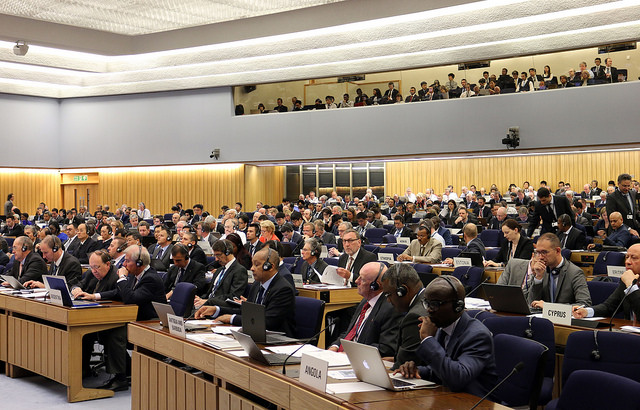
The 98th Maritime Safety Committee © IMO.
News from the IMO
The 98th meeting of the Maritime Safety Committee (MSC) was held at the International Maritime Organization (IMO) headquarters in London, UK, on 7–16 June.
The agenda was mainly dedicated to:
- Autonomous ship regulations.
- Maritime security, including guidelines for cyber risk management.
- Verification of goal-based standards.
- Unsafe mixed migration.
- Early implementation of SOLAS instruments.
- Consideration and adoption of amendments to mandatory instruments.
- Consideration of the work of sub committees reporting to MSC.
The main items of interest for OCIMF Members were as follows.
OSV Chemical Code
Following discussion on the draft Offshore Support Vessel (OSV) Chemical Code and some amendments to make it consistent with other codes, the committee approved the text. It will now be forwarded to the Marine Environmental Protection Committee (MEPC) for concurrent approval and then to the Assembly in November for adoption.
Maritime Autonomous Surface Ships (MASS)
The committee agreed to add a scoping exercise on Maritime Autonomous Surface Ships (MASS) to the provisional agenda for the MSC 99. The scoping exercise will identify the regulations/instruments that need to be considered for revision with the potential introduction of autonomous vessels.
OCIMF inert gas paper
The committee noted with appreciation the OCIMF information paper introducing their work on the use of inert gas for the carriage of flammable oil cargoes <add link>. The committee particularly appreciated the comments and analysis on the use of inert gas on oil tankers regardless of ship size.
The MSC also approved 32 new MSC circulars and a further 5 sub committee/joint circulars.
Maritime Security Snippets
In May, OCIMF was in Bahrain supporting two key events hosted by the U.S. Naval Forces Central Command for the Middle East.
Senior Leadership Symposium
This was an opportunity for Middle East regional leaders responsible for maintaining the free flow of commerce to learn more about the challenges of ensuring regional maritime security. The discussion ranged widely and included the protection of critical assets at sea and ashore, sea lines of communication, safeguarding commercial shipping and the protection of key choke points.
OCIMF members from IMT and BP delivered keynote addresses reminding the audience of the region’s importance for energy and related services.
The International Maritime Exercise 2017 (IMX17)
This was a command post top exercise that included personnel from the U.S. and more than 20 partner nations, as well as industry representatives from four OCIMF members. The aim of the exercise was to promote interoperability, increase readiness of defensive maritime warfare and demonstrate resolve in maintaining regional security and stability and protecting the free flow of commerce.
Four days of academic training included seminars on naval planning, mission analysis and the coordination of forces to increase international cooperation. The important role of industry was highlighted a number of times.
“Having a significant number of international partners working alongside the civilian shipping industry builds a critical understanding to enhance security and cooperation in the region,” said Royal Canadian Navy Lt. Cmdr. Ralph Underhill, lead planner for the exercise.
The exercise itself simulated scenarios that have occurred in or threaten the Middle East. The region encompasses about 2.5 million square miles of water and includes the Arabian Gulf, Arabian Sea, Gulf of Oman, Red Sea and parts of the Indian Ocean. There are 20 countries in the region and three critical choke points: at the Strait of Hormuz, the Suez Canal and the Strait of Bab al Mandeb at the southern tip of Yemen. The Strait of Hormuz sees nearly 20 percent of the world's oil supply transits.
The event gave OCIMF an invaluable opportunity to build on existing industry/military relationships that have been crucial for stopping regional piracy and attacks against merchant vessels. This exercise is intended to be a stepping stone towards a much bigger event in 2019.
Photos below. Top: Senior Leadership Symposium. Bottom: Industry representatives and military officers from Germany, Malaysia, USA and UK at the IMX17.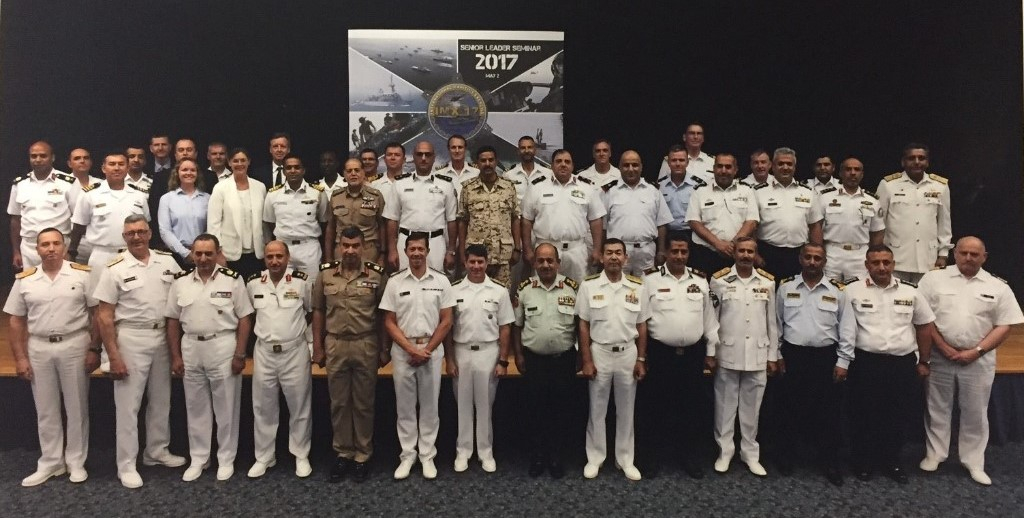
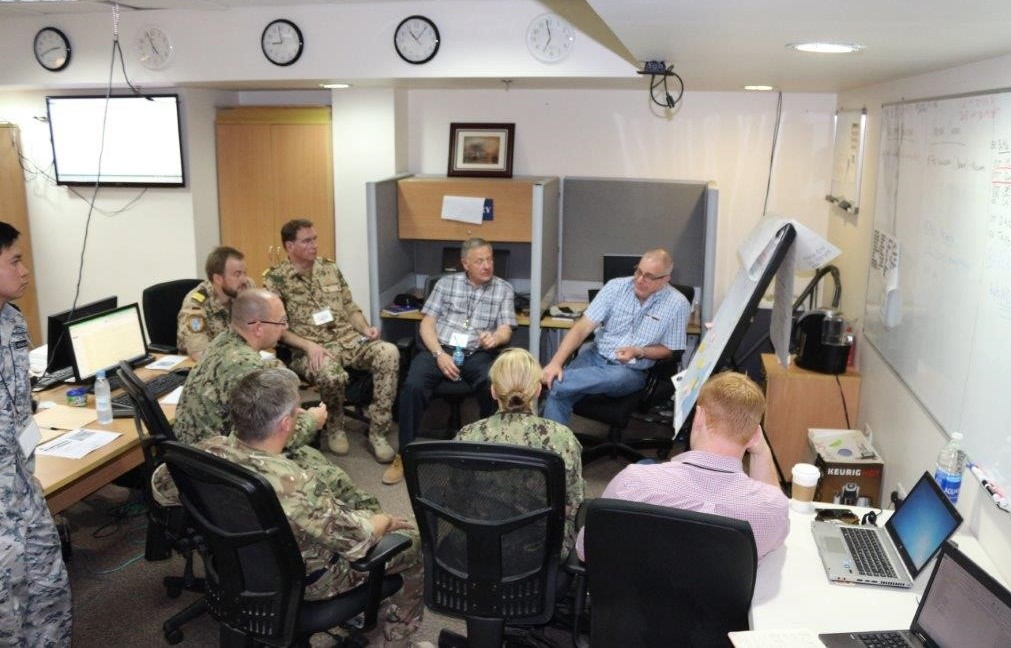
Cyber security
The OCIMF Cyber Working Group (CWG), formed at the end of 2016, has met three times and is making good progress in a number of areas.
Industry cyber security guidelines
The CWG has contributed to the update of The Guidelines on Cyber Security onboard Ships, developed by BIMCO. Version two is in the final stages of drafting and will be published in July.
Cyber educational film
The CWG joined a consortium of industry organisations to develop a cyber educational film aimed specifically at mariners. The aim has been to take several complicated cyber issues and distil them into understandable sound bites for mariners. A short film accompanied by six supporting specialist area modules will be launched on 11 July. Watch the OCIMF website for news.
Cyber Security Symposium
OCIMF has teamed up with IMCA to hold a Cyber Security Symposium on Tuesday 12 September during London International Shipping Week (11–15 September). The symposium will focus on cyber security requirements for vessel operators dealing with third party access to vessel systems. It will examine the issues surrounding third party access to vessel systems and equipment with a view to developing a protocol of understanding and expectation for vessel operators. More detail will be provided in future newsletters.
Cordage Institute/EUROCORD conference
OCIMF was invited to present at the joint Cordage Institute/EUROCORD Conference on 19 June in Palma, Mallorca, Spain.
It was a great opportunity for OCIMF to meet with professionals from the cordage industry and for all the organisations to learn from each other. Joe Megeed (OCIMF) presented an overview of the OCIMF organisation, committee structure and an update on the revision of the Mooring Equipment Guidelines (MEG), specifically the mooring line chapter. Tim Hunter (Bridon-Bekart) and Kris Volpenhein (Samson) from the High Modulus Synthetic Fibres (HMSF) Working Group gave the conference an update and more detailed insight on the new philosophies of mooring lines in MEG. These included details on the procurement process of mooring lines, condition monitoring of mooring lines and retirement of the mooring lines prior to failure.
OCIMF, the Cordage Institute and EUROCORD have worked diligently together over the past two years to incorporate the lessons learned from the MAIB report 'Failure of mooring line on board LNG carrier Zarga with 1 person injured'. OCIMF is grateful for the support of the Cordage Institute and EUROCORD in helping to make mooring safer for our industry by creating robust new guidelines.
